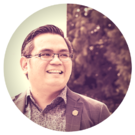Documentation:New Faculty Orientation Guide/All Faculty Spotlights
Faculty Spotlight - Get Started

Marcello Pavan, PhD Sessional Lecturer
Department of Physics and Astronomy, Faculty of Science
In summer 2011, UBC Physics and Astronomy approached me to teach the Physics 100 course. I taught laboratory courses there before, but never a big lecture course, so to say I was nervous would be an understatement. Fortunately, UBC set me up to succeed, first with the department asking me to give a practice lecture to their teaching subcommittee, and then with the support of colleagues in the (then) Carl Wieman Science Education Initiative and CTLT. By the time it came to teach, I felt ready to go. Then of course the realization that things were harder than first thought set in, but the continued support of colleagues and CTLT has sustained me. Now I can’t wait to face those students again every September!
Faculty Spotlight - Classroom Climate

John Paul (JP) Catungal, Instructor
Critical Race and Ethnic Studies, Institute for Gender, Race, Sexuality and Social Justice
I have come to appreciate the classroom as embedded in larger historical and political contexts, where we, as teachers and students, meet not as blank slates, but as complicated and differently positioned subjects.
I am teaching a fourth-year seminar this term that specifically looks at the politics of the university. In this seminar, we will reflect as a learning community on a variety of topics, including UBC’s location on unceded Musqueam territory, questions of positionality and accessibility and why they matter for how we experience the university.
Excessive emotions, such as anger, are particularly challenging for classroom spaces—challenging because they force us to acknowledge that trust, belonging and community in learning relationships and spaces are never a guarantee and, in fact, take constant tending. These excessive emotions are also challenging in a second way, which is that, in some classrooms, they arise out of social structural dynamics—e.g., misogyny, racism, colonialism, homophobia—that may or may not be the central focus of a course, but that nevertheless exist in classroom spaces through the very bodies and minds that are in these spaces.
Faculty Spotlight - Student Success

Dana Devine, PhD Professor and Graduate Studies Program Director
Department of Pathology and Laboratory Medicine, Faculty of Medicine
It’s my role to help my graduate students be the best people that they can be. This involves much more than learning how to do good science. We must encourage our students to be engaged citizens of the world. This involves ensuring they get out of the lab and classroom and do more than their degree requirements: engage with nature, be physically active, create and grow personally. We owe our students the latitude to take advantage of the many programs that UBC offers to graduate students to help them develop skills that will be valuable in more than just campus life. Graduate school is hard and students must be both intellectually challenged and emotionally supported. My hopes for the graduate students I mentor are that they leave UBC as well-trained scientists who are honest and open communicators, societally engaged and unafraid to care about other people. These are the graduate students who will change the world.
Faculty Spotlight - First Day of Class

Gail Hammond, PhD, RD
Instructor, Food, Nutrition and Health, Department of Land and Food Systems
When getting ready to start a new class, my mind always goes to the students: who are they? What life experiences do they bring to class? Why are they taking the course? What piques their interest about nutrition? How do they like to learn? Will they value self-regulated learning activities as much as I do? The questions go on and on, but all this to say expect the unexpected! There is great diversity to manage within each class as the students turn to you to guide them on their journey of learning. So, put your hand on the rudder and get ready to sail!
When opening the classroom door, I am excited to meet the students—the lifeblood of the course. Once inside the classroom, I like to engage them in an activity so they can know a little bit about their neighbours, the TAs and me. Fostering an open and inclusive environment on day one of the term—a simple technique is to ask questions that tie course concepts into their personal lives—sets the tone for the remainder of the course. Enjoy the sail!
Faculty Spotlight - Evaluation of Teaching

Oral Robinson
PhD Lecturer and Honours Chair, Department of Sociology, Faculty of Arts
Peer review of my teaching helped me to better understand my strengths as an instructor and identify areas of development. At the pre-observation meeting, I received guidance in identifying and articulating my goals, which guided the class observation and the evaluation of my course resources (syllabi and assignments). The process helped me think more critically about how my desired practice aligned with actual experiences and my teaching philosophy. The post-observation was particularly helpful in highlighting my strengths from an objective. Most importantly, I was directed to many resources and best practices—including from other colleagues—to support my development. Overall, the process increased my confidence as an instructor and enhanced my teaching capability via practical support. I would highly recommend peer review of teaching for both new and seasoned instructors.
Faculty Spotlight - Learning Technology

David Gaertner
PhD Instructor, First Nations and Indigenous Studies, Faculty of Arts
I’ve found that the best way to integrate technology into your classroom is to go with what you know. My background is in community radio. I worked as a Program Assistant during my time as a graduate student and radio and podcasts are an integral part of how I share and consume information in my day-to-day life. However, I never really considered integrating them into my classrooms until I was five years into my teaching career. When the lightbulb finally went off, I set up a meeting with the staff at CiTR 101.9 and we discussed ways to integrate their resources into my syllabi in mutually beneficial ways. Now my students create podcasts based on their class learning and CiTR is able to use some of this content in their programming. Podcasting allows students to share their ideas beyond the gilded boundaries of the ivory tower and provides hands-on opportunities to discuss key topics in my field such as knowledge dissemination and mobilization, open access and representation. Drawing from my experiences with podcasting, I felt empowered to integrate other technologies like Wikis, Twine and Omeka. Start with what you love and learn it's ok to make mistakes. I am always inspired by the things my students create.

